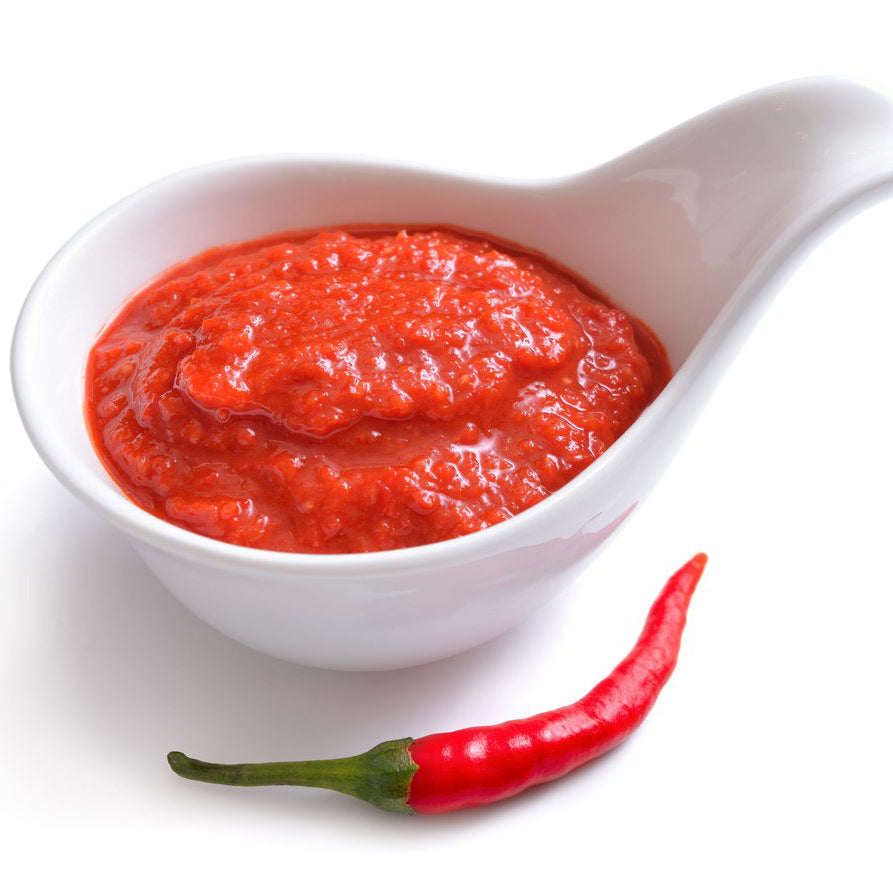Recent Post

Is Hot Sauce Good for You? What to Know

Ignite Your Taste Buds with Trump

Spice Up Your Meals with 50 Caliber Hot Sauce

Introducing 50 Caliber Hot Sauce

Hot sauce Spicy condiment Military condiment

50 Caliber Hot Sauce: The Perfect Condiment

Is Hot Sauce Good for You? What to Know
Is Hot Sauce Good for You? What to Know
Hot sauce, a condiment made from chili peppers, is great for giving foods a spicy kick. It’s often added to dishes like burgers, burritos, tacos, eggs, and marinades.
Despite its widespread use, many people may wonder how this spicy staple affects their health.
This article explores the research to determine whether the hot sauce is good for you.
Nutritional value
Hot sauce is very low in calories and free of carbs, fat, and protein.
Just 1 teaspoon (5 mL) contains:
Calories: 0.5
Protein: 0 grams
Fat: 0 grams
Carbs: 0 grams
Vitamin C: 4% of the Daily Value (DV)
Because it’s used in such small amounts, it’s very low in vitamins and minerals.
Still, each serving contains a small amount of vitamin C, a water-soluble vitamin that plays a key role in immune function. This vitamin also acts as an antioxidant, neutralizing harmful compounds called free radicals to protect against inflammation.
Contains capsaicin
Hot sauce boasts capsaicin, the compound that gives chili peppers their signature spice.
This compound is associated with a long list of benefits, including:
Pain relief. Capsaicin is sometimes applied topically to help reduce pain. It works by stimulating pain receptors in your body and may help treat conditions like rheumatoid arthritis and diabetic neuropathy, a type of diabetes-related nerve damage.
Weight loss. Some research suggests that capsaicin increases your metabolism, boosts fat burning, and decreases appetite, all of which may benefit weight loss.
Decreased inflammation. Test-tube studies reveal that this compound may lower certain markers of inflammation.
Cancer prevention. While research in humans is needed, test-tube studies indicate that capsaicin may slow the growth and spread of certain types of cancer cells.
It’s important to note that hot sauce is typically used in small amounts. Most people only consume 1–2 teaspoons (5–10 mL) at a time.
Therefore, because most studies use very high doses of capsaicin, it’s unclear how much hot sauce you would have to eat to obtain similar results.
Additionally, due to its capsaicin content, hot sauce may cause certain side effects, including acid reflux, stomach cramps, and a burning sensation on the skin.
May be high in sodium
Hot sauce may be high in sodium depending on the brand, type, and serving size.
In fact, 1 teaspoon (5 mL) contains about 124 mg of sodium. For reference, most regulatory organizations in the United States, Canada, and the United Kingdom recommend limiting sodium intake below 2,300–2,400 mg per day.
Reducing sodium intake may be especially beneficial for those with high blood pressure, as doing so may lower this health marker to help prevent heart attack and stroke.
Keep in mind that some people may be more sensitive to the effects of salt than others. If you know that you’re salt-sensitive, you may want to go easy on the hot sauce.
Still, hot sauce is lower in sodium than many other condiments and can fit into a heart-healthy diet if you enjoy it in moderation alongside other nutritious, low sodium ingredients.
How to choose a healthy hot sauce
Although hot sauce fits into a healthy, well-rounded diet, it’s important to remember that not all varieties are created equal.
In fact, some types of hot sauce are loaded with sodium, additives, and other unhealthy ingredients that harm your health.
Thus, you should read the nutrition label carefully and pick a product that’s low in sodium, especially if you’re following a low sodium or heart-healthy diet.
You should also look at the ingredient list and steer clear of any products that contain a lot of artificial additives, preservatives, or food dyes.
Instead, choose hot sauces that contain a few simple ingredients, such as peppers, vinegar, salt, and spices.
The bottom line
Hot sauce is typically low in calories and free of carbs, protein, and fat.
It also contains a bit of vitamin C and capsaicin, which have been associated with numerous health benefits.
However, it also packs a fair amount of sodium in each serving, so you should choose a product that’s low in sodium and free of artificial ingredients or other additives.
Hot sauce, a condiment made from chili peppers, is great for giving foods a spicy kick. It’s often added to dishes like burgers, burritos, tacos, eggs, and marinades.
Despite its widespread use, many people may wonder how this spicy staple affects their health.
This article explores the research to determine whether the hot sauce is good for you.
Nutritional value
Hot sauce is very low in calories and free of carbs, fat, and protein.
Just 1 teaspoon (5 mL) contains:
Calories: 0.5
Protein: 0 grams
Fat: 0 grams
Carbs: 0 grams
Vitamin C: 4% of the Daily Value (DV)
Because it’s used in such small amounts, it’s very low in vitamins and minerals.
Still, each serving contains a small amount of vitamin C, a water-soluble vitamin that plays a key role in immune function. This vitamin also acts as an antioxidant, neutralizing harmful compounds called free radicals to protect against inflammation.
Contains capsaicin
Hot sauce boasts capsaicin, the compound that gives chili peppers their signature spice.
This compound is associated with a long list of benefits, including:
Pain relief. Capsaicin is sometimes applied topically to help reduce pain. It works by stimulating pain receptors in your body and may help treat conditions like rheumatoid arthritis and diabetic neuropathy, a type of diabetes-related nerve damage.
Weight loss. Some research suggests that capsaicin increases your metabolism, boosts fat burning, and decreases appetite, all of which may benefit weight loss.
Decreased inflammation. Test-tube studies reveal that this compound may lower certain markers of inflammation.
Cancer prevention. While research in humans is needed, test-tube studies indicate that capsaicin may slow the growth and spread of certain types of cancer cells.
It’s important to note that hot sauce is typically used in small amounts. Most people only consume 1–2 teaspoons (5–10 mL) at a time.
Therefore, because most studies use very high doses of capsaicin, it’s unclear how much hot sauce you would have to eat to obtain similar results.
Additionally, due to its capsaicin content, hot sauce may cause certain side effects, including acid reflux, stomach cramps, and a burning sensation on the skin.
May be high in sodium
Hot sauce may be high in sodium depending on the brand, type, and serving size.
In fact, 1 teaspoon (5 mL) contains about 124 mg of sodium. For reference, most regulatory organizations in the United States, Canada, and the United Kingdom recommend limiting sodium intake below 2,300–2,400 mg per day.
Reducing sodium intake may be especially beneficial for those with high blood pressure, as doing so may lower this health marker to help prevent heart attack and stroke.
Keep in mind that some people may be more sensitive to the effects of salt than others. If you know that you’re salt-sensitive, you may want to go easy on the hot sauce.
Still, hot sauce is lower in sodium than many other condiments and can fit into a heart-healthy diet if you enjoy it in moderation alongside other nutritious, low sodium ingredients.
How to choose a healthy hot sauce
Although hot sauce fits into a healthy, well-rounded diet, it’s important to remember that not all varieties are created equal.
In fact, some types of hot sauce are loaded with sodium, additives, and other unhealthy ingredients that harm your health.
Thus, you should read the nutrition label carefully and pick a product that’s low in sodium, especially if you’re following a low sodium or heart-healthy diet.
You should also look at the ingredient list and steer clear of any products that contain a lot of artificial additives, preservatives, or food dyes.
Instead, choose hot sauces that contain a few simple ingredients, such as peppers, vinegar, salt, and spices.
The bottom line
Hot sauce is typically low in calories and free of carbs, protein, and fat.
It also contains a bit of vitamin C and capsaicin, which have been associated with numerous health benefits.
However, it also packs a fair amount of sodium in each serving, so you should choose a product that’s low in sodium and free of artificial ingredients or other additives.
